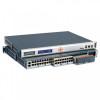Lantronix SLC 8000 Advanced Console Manager User Guide - Page 174
Data Settings, Modem Settings, Data Bits, Parity, Stop Bits, Flow Control, none, xon/xoff, rts/cts
 |
View all Lantronix SLC 8000 Advanced Console Manager manuals
Add to My Manuals
Save this manual to your list of manuals |
Page 174 highlights
8: USB/SD Card Port 6. Enter the following fields. Data Settings Note: Check the modem's equipment settings and documentation for the proper settings. The attached modem must have the same settings. Baud Data Bits Parity Stop Bits Flow Control The speed with which the device port exchanges data with the attached serial device. From the drop-down list, select the baud rate. Most devices use 9600 for the administration port, so the device port defaults to this value. Check the equipment settings and documentation for the proper baud rate. Note: Cypress ACM-based USB to serial chip set does not support 230400 baud rate. Number of data bits used to transmit a character. From the drop-down list, select the number of data bits. The default is 8 data bits. Parity checking is a rudimentary method of detecting simple, single-bit errors. From the drop-down list, select the parity. The default is none. The number of stop bit(s) used to indicate that a byte of data has been transmitted. From the drop-down list, select the number of stop bits. The default is 1. A method of preventing buffer overflow and loss of data. The available methods include none, xon/xoff (software), and rts/cts (hardware). The default is none. Modem Settings Note: Depending on the State and Mode you select, different fields are available. State Mode Use Sites Indicates whether an external modem is attached to the device port. If enabling, set the modem to dial-out, dial-in, dial-back, dial-on-demand, dial-in/host list, or dial in, dial-on-demand, CBCP Server, and CBCP Client. Disabled by default. See Modem Dialing States (on page 254) for more information. The format in which the data flows back and forth: Text: In this mode, the SLC unit assumes that the modem will be used for remotely logging into the command line. Text mode can only be used for dialing in or dialing back. Text is the default. PPP: This mode establishes an IP-based link over the modem. PPP connections can be used in dial-out mode (e.g., the SLC 8000 advanced console manager connects to an external network), dial-in mode (e.g., the external computer connects to the network that the SLC unit is part of), or dialon-demand. Enables the use of site-oriented modem parameters which can be activated by various modem-related events (authentication, outbound network traffic for dialon-demand connections, etc.). Sites can be used with the following modem states: dial-in, dial-back, dial-on-demand, dial-in & dial-on-demand, dial-back & dial-on-demand, and CBCP server. SLC™ 8000 Advanced Console Manager User Guide 174















